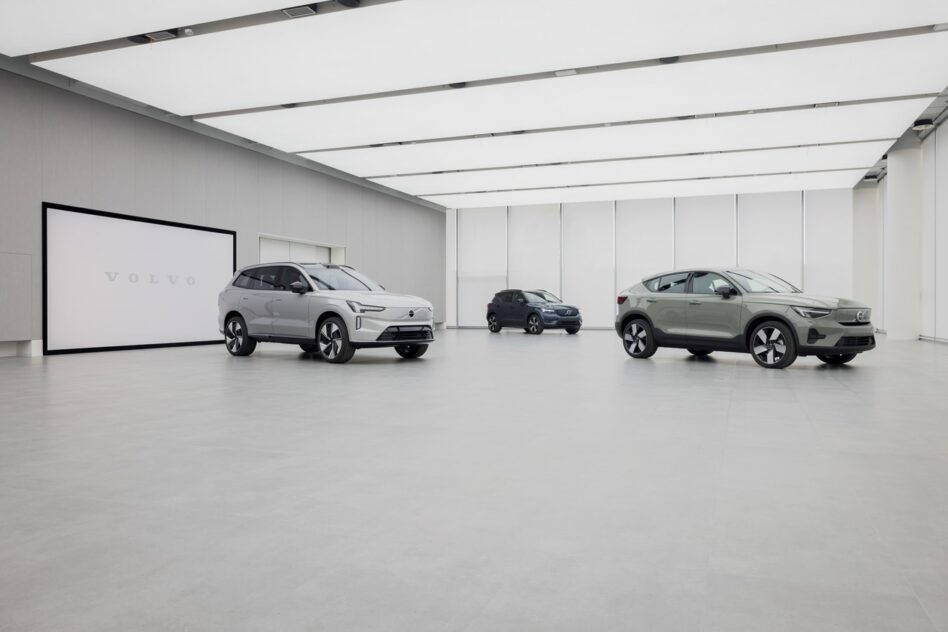
Image: Volvo.com
In a press announcement released this week, Volvo revealed that it will put an end to its UK wholesale operations and starting in June will fully adopt a direct market business system, similar to the way Tesla operates.
This change will be an essential component of Volvo’s long-term goals and growth prospects. By 2030, Volvo vehicles aim to be totally electric-powered and will be the prompt for many other innovations Volvo customers will soon be able to enjoy.
As Europe is Volvo’s biggest sales region, it is the furthest along in the process and is driving the electric revolution. In the UK, the change from wholesale to direct sales has already begun commencing, and several direct sales channels are already up and running.
In fact, it has been possible to purchase a Volvo car online in the UK since 2019. In 2020, Volvo launched the ‘Care by Volvo’ subscription service which offers customers new and flexible ways to conventional car ownership. So far, over 12,000 Volvo cars have been sold through the direct sales methods.
June will be an important month as it marks the next phase of Volvo’s ambition plan. The UK will become the first completely direct market after the wholesale channels shut down in June. Despite the big change, Volvo will not be closing its car retailers and will continue to use them as an integral part of the new online purchasing experience.
After the new changes in the UK market have taken effect, Sweden will be the next market to switch to the direct sales model. Other European markets will then follow as soon as they are ready. Volvo will also introduce business models such as subscription leasing to these markets shortly after.
Volvo’s new flexible approach in the UK will be a way of gauging customer interest before adopting it across the rest of Europe. It will allow customers the choice of how to access a new Volvo car, be it through direct purchase, subscription, leasing, Personal Contract Purchase (PCP), or Volvo Loan.
Similar to Volvo, other vehicle manufacturers are also moving away from the traditional dealership model. Tesla was the first to successfully sell directly to buyers by way of an online ordering service. Even though Tesla does use showrooms for customers to view and test drive its vehicles, the majority of actual sales are done primarily through online means.
Traditionally, car manufacturers sell their vehicles to independent car dealerships, usually at a wholesale price, and the dealers then induct a sales margin. This sales margin is a big obstacle for standard car makers as it can greatly add to overall vehicle price and affect sales negatively.
With companies such as Volvo focusing on electric vehicles as well as moving away from the traditional car dealership model, Ford has also just announced that its electric vehicle branch, Ford E, will soon also start using the direct sale method. Like Volvo, Ford will also start greatly reducing its physical inventories in favor of online channels and will also utilize new marketing strategies that focuses on customer’s needs and wants instead of simply spending millions on advertising and broadcast campaigns.
With so many car companies now focusing on electric vehicles and direct sales, other vehicle manufacturers may now have to do the same if they want to stay competitive in the industry going forward.

Image: Volvo.com
In a press announcement released this week, Volvo revealed that it will put an end to its UK wholesale operations and starting in June will fully adopt a direct market business system, similar to the way Tesla operates.
This change will be an essential component of Volvo’s long-term goals and growth prospects. By 2030, Volvo vehicles aim to be totally electric-powered and will be the prompt for many other innovations Volvo customers will soon be able to enjoy.
As Europe is Volvo’s biggest sales region, it is the furthest along in the process and is driving the electric revolution. In the UK, the change from wholesale to direct sales has already begun commencing, and several direct sales channels are already up and running.
In fact, it has been possible to purchase a Volvo car online in the UK since 2019. In 2020, Volvo launched the ‘Care by Volvo’ subscription service which offers customers new and flexible ways to conventional car ownership. So far, over 12,000 Volvo cars have been sold through the direct sales methods.
June will be an important month as it marks the next phase of Volvo’s ambition plan. The UK will become the first completely direct market after the wholesale channels shut down in June. Despite the big change, Volvo will not be closing its car retailers and will continue to use them as an integral part of the new online purchasing experience.
After the new changes in the UK market have taken effect, Sweden will be the next market to switch to the direct sales model. Other European markets will then follow as soon as they are ready. Volvo will also introduce business models such as subscription leasing to these markets shortly after.
Volvo’s new flexible approach in the UK will be a way of gauging customer interest before adopting it across the rest of Europe. It will allow customers the choice of how to access a new Volvo car, be it through direct purchase, subscription, leasing, Personal Contract Purchase (PCP), or Volvo Loan.
Similar to Volvo, other vehicle manufacturers are also moving away from the traditional dealership model. Tesla was the first to successfully sell directly to buyers by way of an online ordering service. Even though Tesla does use showrooms for customers to view and test drive its vehicles, the majority of actual sales are done primarily through online means.
Traditionally, car manufacturers sell their vehicles to independent car dealerships, usually at a wholesale price, and the dealers then induct a sales margin. This sales margin is a big obstacle for standard car makers as it can greatly add to overall vehicle price and affect sales negatively.
With companies such as Volvo focusing on electric vehicles as well as moving away from the traditional car dealership model, Ford has also just announced that its electric vehicle branch, Ford E, will soon also start using the direct sale method. Like Volvo, Ford will also start greatly reducing its physical inventories in favor of online channels and will also utilize new marketing strategies that focuses on customer’s needs and wants instead of simply spending millions on advertising and broadcast campaigns.
With so many car companies now focusing on electric vehicles and direct sales, other vehicle manufacturers may now have to do the same if they want to stay competitive in the industry going forward.



